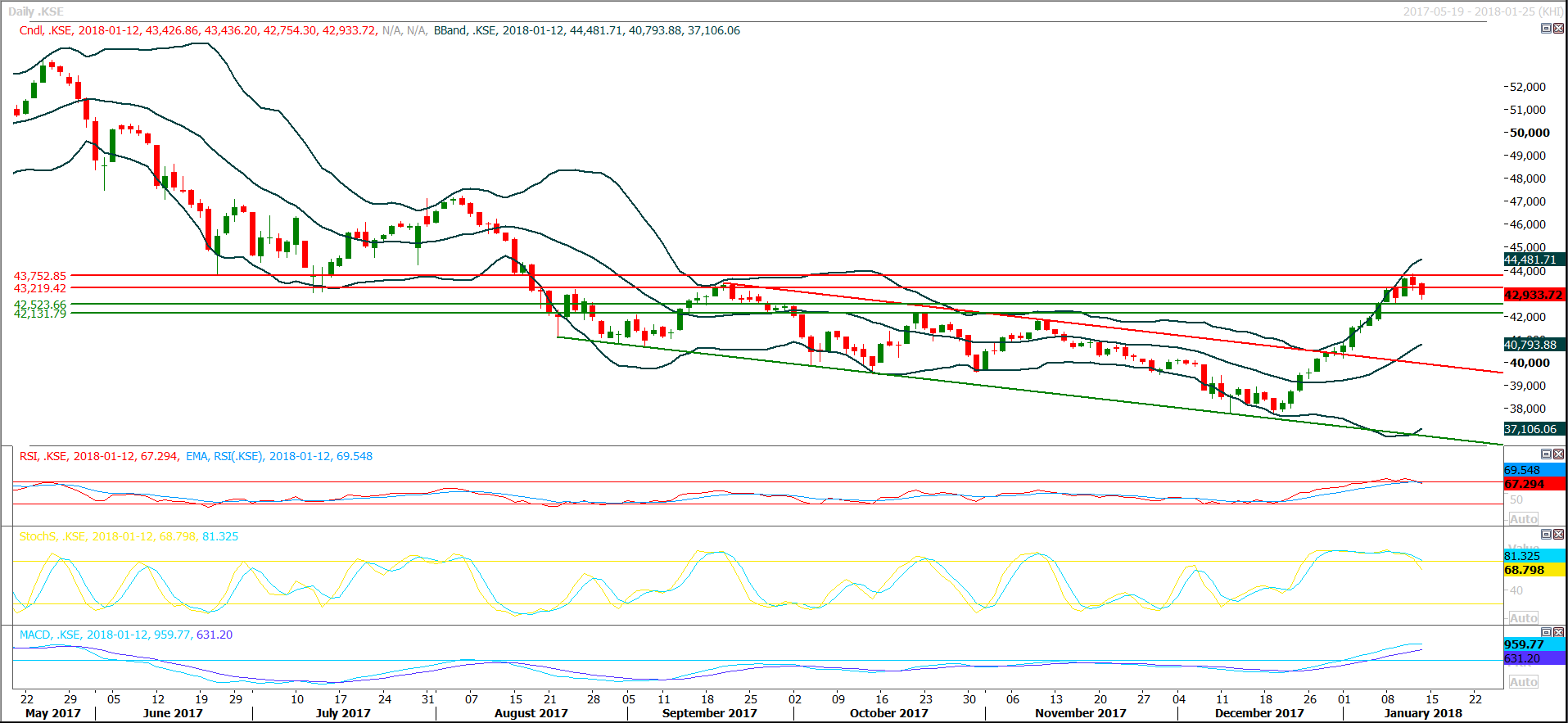Previous Session Recap
Trading volume at PSX floor dropped by 80.78 million shares or 25.29% on DoD basis during last trading session, whereas the benchmark KSE100 Index opened at 43426.86, posted a day high of 43436.20 and a day low of 42754.30 during last trading session. The session suspended at 42933.72 with net change of -461.56 and net trading volume of 108.96 million shares. Daily trading volume of KSE100 listed companies dropped by 54.22 million shares or 33.23% on DoD basis.
Foreign Investors remained in net buying of 4.9 million shares and net value of Foreign Inflow increased by 7.45 million shares. Categorically, Foreign Individuals Corporate and Overseas Pakistani investors remained in net buying of 0.09, 0.94 and 3.87 million shares respectively. While on the other side Local Individuals, Banks, Mutual Funds and Insurance Companies remained in net buying of 0.45, 0.91, 1.75 and 4.83 million shares respectively but Local Companies, NBFCs and Brokers remained in net selling of 1.06, 2.88 and 7.08 million shares respectively.
Analytical Review
Asian shares hit historic highs on Monday after Wall Street extended its record-breaking run, while the U.S. dollar retreat continued as investors priced in the risk of tighter policies elsewhere in the developed world. Activity was restrained somewhat as a U.S. holiday curbed trade in cash Treasuries, though E-Mini futures for the S&P500 still made gains of 0.22 percent. MSCI’s broadest index of Asia-Pacific shares outside Japan rose 0.6 percent, having finally cleared the former all-time top of 591.50 from late 2007. Australia’s main index firmed 0.2 percent, while Japan’s Nikkei added 0.3 percent. Stocks in Hong Kong jumped 0.9 percent to another record. Investors were optimistic that Chinese gross domestic product data for the December quarter due on Thursday would show growth of at least 6.7 percent for the world’s second biggest economy.
THE recent sharp rebound in global oil prices on the back of supply cuts by the 14-nation Opec oil cartel and other producers led by Russia does not augur well for Pakistan’s economy, industry, exports and households. With around two dozen oil exporters agreeing to extend their deal to limit their production through 2018, crude oil prices are set to spike significantly over the next several months. Last week, global oil prices rallied to more than a three-year high of $70 a barrel. Prices have edged up faster than analysts had expected. Oil has gained almost five per cent since the start of this year, and is forecast to move up further.
GETTING around is going to get tougher with time for Karachiites as the Karachi Circular Railway (KCR) has hit snags — yet again. The mass transit project can potentially serve millions of distressed daily commuters and decongest roads of the megalopolis. Sindh’s leadership accuses the federal government of deliberately blocking a project for political ends. “The domination of Punjab is not just on the country’s resources but also on future opportunities. The perception is not a figment of imagination. It is as real as reality,” said a key member of Sindh’s economic team discussing the KCR and comparing it with the implementation of the Orange Line Metro Train project in Lahore. “The future of CPEC (China-Pakistan Economic Corridor) in Pakistan depends on the fair distribution of its benefits across all provinces,” he added bitterly.
PAKISTAN has evolved a comprehensive package in line with Saudi Vision-2030 to promote bilateral trade and investment between the two countries. The package envisages measures to ease procedures for business visa, remove non-tariff barriers and initiate talks on a preferential trade agreement (PTA). The package will be discussed at a high-level forum — Saudi-Pak Joint Ministerial Commission (JMC) — scheduled for Jan 16 (tomorrow). The commission will be convened with a delay of more than three and a half years as its last meeting was held in April 2014. Over the past few years, Pakistan’s bilateral trade with Saudi Arabia has posted a consistent decline, dropping by a half to $2.5bn in 2016-17 from $5.08 billion in 2013-14. One reason is fall in the value of petroleum products, which constitute 50pc of total imports.
The federal government will try to privatise national airline before general elections due this year, privatisation minister Daniyal Aziz said, as the ruling party seeks to restart sales of state-run businesses. Pakistan International Airlines (PIA), losing market share to Gulf-based rivals such as Etihad and Emirates, has been hit by management turmoil in recent years and a 2016 plane crash that led to 47 deaths. The privatisation of loss-making entities that were draining the exchequer was a key priority for the Pakistan Muslim League-Nawaz (PML-N) party when it swept to power in 2013. PIA was among 68 state-owned companies earmarked for privatisation in return for a $6.7 billion International Monetary Fund package that helped Pakistan to stave off a default in 2013.
Market is expected to remain volatile.
Technical Analysis
The Benchmark KSE100 Index have generated a hammer on weekly chart which is sign of a reversal patter also daily stochastic and MAORSI have generated bearish crossovers and these both would try to push index in negative zone for a correction. As of right now index have supportive regions around 42560 and 42100 points while resistant regions are standing at 43220 and 43760 points. For current trading session its recommended to sell on strenght as index seems in bearish momentum.
 To Open picture in original resolution right click image and then click open image in a new tab
To Open picture in original resolution right click image and then click open image in a new tab


0 Comments
No comments yet. Be the first to comment!
Please log in to leave a comment.